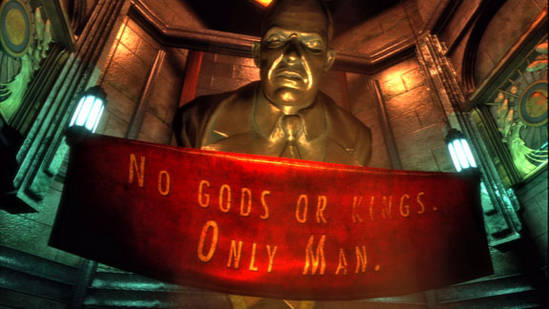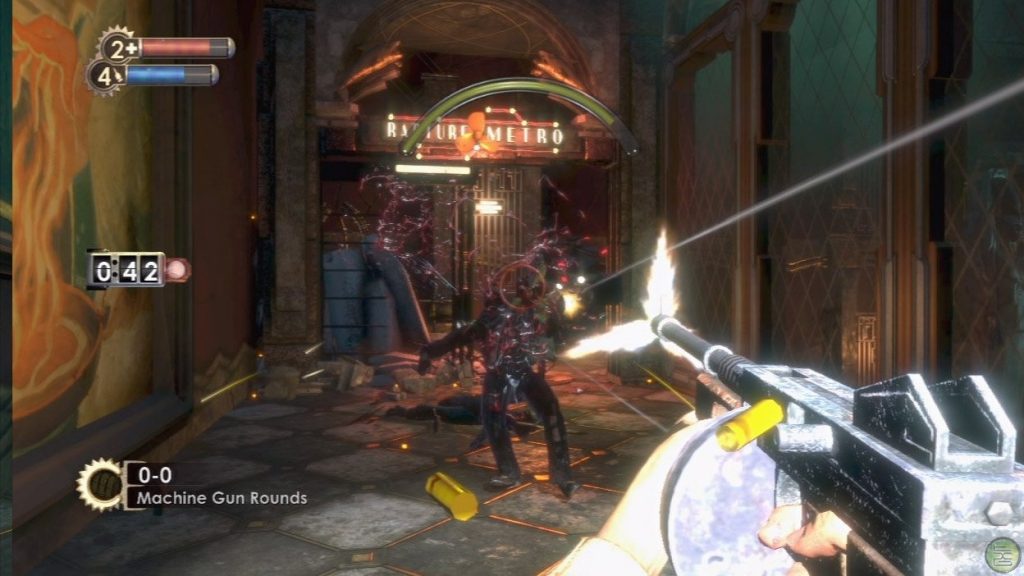The cultural value of Bioshock : the poster child of prestige games
Felan Parker explores in his article “Canonizing Bioshock: Cultural Value and the Prestige Game” how Bioshock (2007) exemplifies a “prestige game”, and how the game solidified its reputation as one.
Prestige games are a special class of big budget AAA games that distinguish themselves from other blockbusters with their perceived artistic quality and ambitions. They’re akin to prestige films, which represent the most prestigious Hollywood films. Historically in Western culture legitimate art has had to distance itself from the “corrupting force” of the marketplace. Prestige films represent a “happy medium” between the lofty ambitions of independent art films and commercial big budget films. Similarly prestige games offer more “artistic” experiences within familiar AAA trapping. Bioshock is heralded as one of the major prestige games of our era, and it has served as a catalyst for critical discourse on the cultural and artistic merits of video games.
Bioshock’s position as a “prestigious blockbuster” is apparent both in the game’s marketing as well as in its critical reception. Although words such as innovative and intelligent were used to describe the gameplay and Art Deco setting to elevate the game above more run of the mill first person shooter (FPS) games, the developers simultaneously emphasized that at its core, the game is a “kick-ass shooter’’. Millions of dollars were invested in a marketing budget to help overcome the game’s lack of previous brand awareness. The duality of balancing between commercial interests and artistic ambitions can be witnessed in the promotional material, which stresses the game’s thematic depth.
The storyline and its themes was one of the most hailed aspects of Bioshock. It was viewed as a game with “something to say”. The notion that not only is the storyline interesting, but that it also covers weighty themes and poses serious questions helped to elevate the game above its AAA peers in the narrative department. The game however sets itself apart from other, more serious games with a message through its nonpartisan stance towards the issues it raises. The attractive, easily marketable gameplay helped to sell the message and philosophical themes raised by the game to the gaming masses in a way serious art games were/are incapable of doing. This is characteristic for a prestige game: taking sides in a divisive issue or sacrificing entertainment value for the sake of delivering a message would limit the game’s mainstream appeal.
While Bioshock was almost universally praised as a landmark title, it had its detractors. One of its criticisms that has resonated the most in wider discourse surrounding video games is the concept of ludonarrative dissonance. Some critics see a “powerful dissonance” between the gameplay (ludo) and story (narrative) elements of the game, where in the game undermines its own story through the gameplay. Other writers see this dissonance as a deliberate subversion of player agency that turns the game’s plot into a form of metacommentary.
The game’s follow up, Bioshock Infinite (2013) met a more critical reception, even though it’s also seen as a prestige game. The commentary surrounding Infinite speaks of grown expectations, one critic said that the biggest problem with it is that “it’s not 2007 anymore”. The alleged maturation of the medium, brought forth by titles such as the original Bioshock, hasn’t been steady and brisk enough for some people’s tastes. For that reason, there’s now a growing number of people who feel that the limitations imposed upon developers by big budget AAA development are no longer acceptable, and that the mainstream game industry is incapable of producing culturally valuable games. Industry commentators have started predicting that narratively driven single player experiences with prestigious artistic aspirations are increasingly seen as an unnecessary economic risk within the game industry that’s not worth taking, so the future of the prestige game is unclear. But for the time being at least, Bioshock has established its position as the posterboy of prestige games for the ongoing critical and scholarly attention it has received, and it’s viewed as “required playing” as a work of artistic and historical importance.
Original article: http://journals.sagepub.com.helios.uta.fi/doi/full/10.1177/1555412015598669
Picture sources:
http://www.firsthour.net/screenshots/bioshock/bioshock-no-gods-or-kings-only-man.jpg
http://www.firsthour.net/screenshots/bioshock/bioshock-bloody-machine-gun-splicers.jpg


